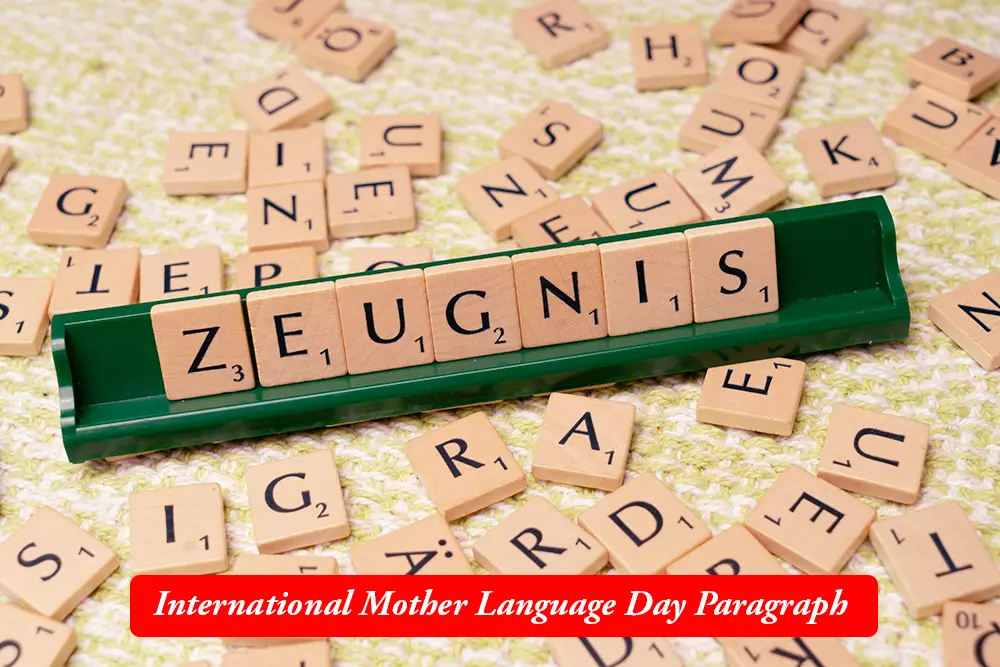International Mother Language Day Paragraph is important for candidates of Class six to 12. We have presented here the International Mother Language Day paragraph for class 6 to 12 students. Hope our 6th, 7th, 8th, 9th, 10th, SSC, and HSC students will benefit from this article.
International Mother Language Day Paragraph for class 6 to 8 in 150 words:
The 21st February is a red letter day in our national life. On this day in 1952, the bravest sons of our motherland laid down their lives to protect the interest of our mother tongue. Since then we had been observing this day as “Shaheed Day”. But in 1999, UNESCO declared this day as “ International Mother Language Day”.
This announcement has turned a national celebration into an international event. We used to celebrate the day at our national level because it was not only important regarding our mother tongue. Rather, the day had greatly influenced all the struggles of the people to establish legal rights including our Liberation War. But with the announcement of the UNESCO, a new dimension has been added to the day.
The learning of the day is that we all should respect the mother languages of others. Our mother language is our unique possession. In the same way, other people’s mother languages are also priceless for them. In broader sense, the day teaches us to have respect for other people’s rights and privilege. On this way, everybody wake up early and gathers before the Martyr’s monument barefooted just to offer their profound respect to the Martyr’s. They offer flowers and wreaths on the pavement. The government and different organizations arrange programmes to celebrate the day. All the States under UNO also celebrate the day every year.
Read More : My Aim in Life paragraph – for class 6 to Hon’s
International Mother Language Day Paragraph for class SSC in 200 words:
The Language movement was the unique movement carried out in East Pakistan which is now Bangladesh. Pakistan came into being in 1947. The Pakistani rulers refused to give proper honor to Bangla the language of 56 percent population of Pakistan who lived in the erstwhile East Pakistan. In March 1948, Mohammed Ali Jinnah, then the Governor General of Pakistan, declared in the convocation of Dhaka University that Urdu and only Urdu shall be the state language of Pakistan.
All the patriotic people of Bangladesh took it as a great blow to their culture. This declaration sowed the seed of the Bangla Language Movement. The students and the politically conscious people made a strong protest against this. On February 21, 1952 the Language Movement Committee confirmed to go to the East Pakistan Assembly House from Dhaka University. The East Pakistan Govt. Promulgated section 144 in the University and Assembly area.
The students of East Pakistan violated it. The police opened fire and the streets of Dhaka University was stained with the blood of Barkat, Rafique, Salam, Jabbar and others. The following day, the strike paralyzed the whole of East Pakistan. At last the Pakistani ruler was compelled to accept Bangla as one of the state languages of Pakistan. This Language Movement created a new national awareness which culminated in the creation of Independence Bangladesh. Bangladesh Observers 21 February as Martyr Day every year. The UNO declared this day as International Mother Language Day. So since then we have been observing this day as our international Mother Language Day all over the world.
Also Read : Air pollution Paragraph – for class 6 to hon’s
International Mother Language Day Paragraph for class HSC in 250 words:
Each and every nation has got some remarkable or memorable days. As an independent nation, Bangladesh is not an – exception to it. Our Mother Language Day or 21st February is regarded as a memorable day in the history of Bangladesh. It is the day when the people of Bangladesh sacrificed their lives for the sake of their mother tongue. So it is called “SHAHEED DAY”. It is a red letter day in our national life.
On this day the nation bows down with rich tribute to the language Martyr’s. This immortal 21st February was declared by UNESCO’ s declaration as International Mother Language Day. The day has a historic background. After the birth of Pakistan, Muhammad Ali Jinnah declared that – Urdu and Urdu shall be the state languages of Pakistan. This declaration was devastating and dangerous. All classes of people of Bangladesh burst into anger and raised a strong protest against this declaration.
The common people joined the students and the political leaders with a demand that “ Bangla” should be the state languages as the majority of the population of Pakistan speak in Bangla. Then the people in authority ignored the demand. Then the protesting bodies came out raising slogans in thousands voices and the struggles took a very serious turn. The ruling class became furious and imposed 144 all over the country and banned all meetings and processions. But on the 21 st February, 1952, the students and the public defied 144 and started a procession from Dhaka University campus adjacent to Dhaka Medical College.
The brutal police shot at the procession indiscriminately. The daring Bangalees with strong determination advanced in the midst of firing and lathi charging. As a result many brave sons of Bangladesh like Rafique, Salam, Barkat, Jabbar died. But the Bangalees did not step back. Rather the movement became so strong then that the ruling class was forced to recognize Bangla as one of the languages in Pakistan. The importance of 21st February is a great to the people of Bangladesh. During the observance of the day the national flag is kept hoisting half mast everywhere.
The head of the government places floral wreaths on the Central Shaheed Minar at one minute past 12 midnight paying a rich homage to the mother tongue and the language martyrs as well. People throughout the country erect Shaheed Minar and on this day put garlands of flowers on its altar as a mark of profound respect. They also hold a meeting before it. They make speeches and pray for the salvation of the departed souls of the language martyrs of 1952. People bring out a Provat Ferry in the morning singing the patriotic songs in chorus – “Amar Bhayer Raktey Rangano Ekushey February”. BTB are and Bangladesh Betar broadcast these special programmes. As if Bangla is our mother tongue so we should save our mother tongue before our death with our all efforts in our national life.
Also Read: Water pollution paragraph for class 6 to 12
International Mother Language Day Paragraph for class Degree (pass) & Hon’s in 350 words:
International Mother Language Day is a red letter day in the life of our Bangalee nation. On this day in 1952, the brave sons of our motherland laid down their lives to the interest of our mother language. Since then we have been observing this day as “Shaheed Day”. But in 1999, UNESCO declared this day as “International Mother Language Day” all over the world. This declaration has turned a national celebration into an international l event.
We used to celebrate the day at our national level because it was not only important regarding our mother tongue. Rather, the day had greatly influenced all the struggles of the people to establish legal rights including our Liberation War. But with the declaration of the UNESCO, a new dimension has been added to the day. The teaching of the day is that we all should respect the mother languages of others all over the world.
Our mother language is our unique possession in our national life. In the same way, others people’s mother languages are priceless to them. In broader sense, the day teaches us to have respect for other people’s rights. The importance of 21st February is great to the of Bangladesh. During the observance of the day the national flag is kept hoisting half mast everywhere. The head of the government places floral wreaths on the Central Shaheed Minar at one minute past 12 midnight paying a rich homage to the mother tongue and the language martyrs as well.
People throughout the country erect Shaheed Minar and on this day put garlands of flowers on its altar as a mark of profound respect. They also hold a meeting before it. They make speeches and pray salvation of the departed souls of the language martyrs of 1952. People bring out a Provat Ferry in the morning singing the patriotic songs in chorus – “Amar Bhayer Raktey Rangano Ekushey February”.
BTV and Bangladesh Betar broadcast these special programmes all day long. People of Bangladesh can never forget this memorable day in their life. We are grateful to the UNESCO for the noble and worldwide declaration on our mother tongue. This immortal 21st February of the Bangalees is now being observed throughout the world as the” International Mother Language Day”.
This day had elevated our position in the international community in all over the world. So for the time being it can be said that our mother tongue is our pride and prestige so we should be careful about our mother language and we also should save it anyhow from being polluted in our national life and this is our motto.
International Mother Language Day’s important some questions- FAQ’S
International Mother Language Day, celebrated annually on February 21st, honors the Language Movement in Bangladesh. UNESCO declared this day on November 17, 1999, to commemorate the sacrifices made by students in 1952 to preserve the Bengali language.
Every year on February 21st, we celebrate International Mother Language Day to promote linguistic and cultural diversity, and multilingualism. It honors the sacrifices made in 1952 by those who fought to protect the Bengali language and secure its recognition as their mother tongue.
International Mother Language Day is primarily celebrated to highlight the importance of the Bengali language. It commemorates the Language Movement of 1952, where students sacrificed their lives for the recognition of Bengali. Therefore, Bengali holds a special place as the root cause of this observance.

Taher Mahmud is a dedicated teacher and blogger who has achieved great success in his work field. He was born to parents of Mashuk ahmed and Fathema begum and grew up with the love for learning and exploration. After completing his Bachelor’s degree. He is interested in Computer Writings, Designing & internet browsing etc. Moreover, I practice English with my beloved friend MD. Abdul QUDDUS & computer with my friend a smart blogger & designer MD.Juyel Ahmed Liton.
This is our small effort thinking about the young students and the source of good guidence.





